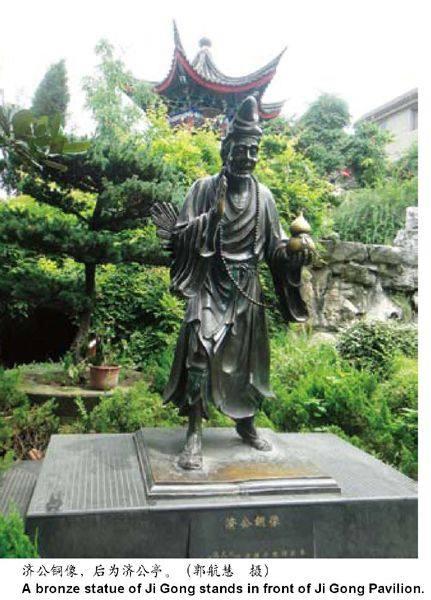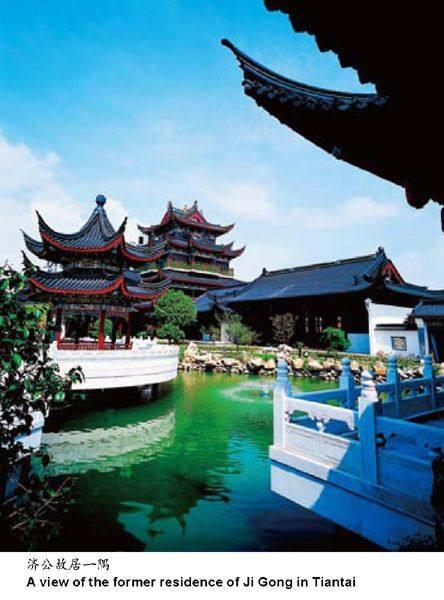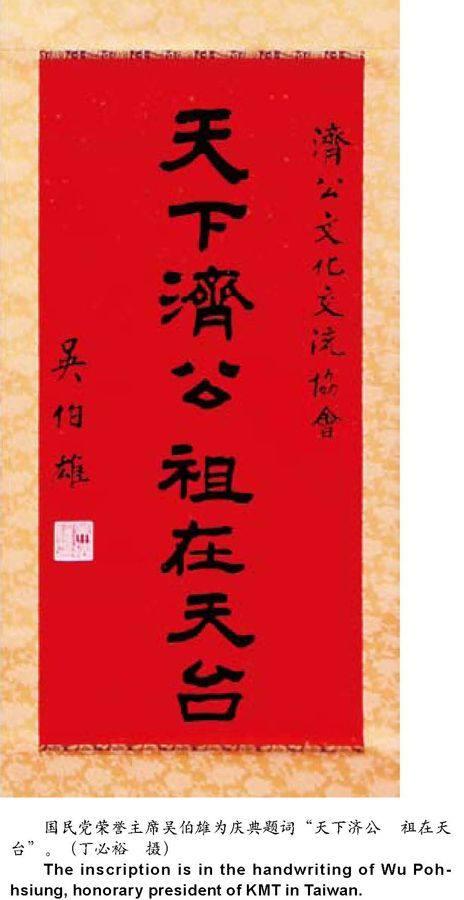兩岸共揚濟公文化
陳敢



天臺縣作為濟公的祖庭圣地,長期以來致力于保護和弘揚濟公文化。今年6月,海峽兩岸濟公文化研究專家、學者和國際友人等2000余人,齊聚天臺赤城山濟公文化廣場,首次舉行“濟公成道,祖庭祈福”大典,成為一件盛事。
濟公文化是中華優秀傳統文化的重要組成部分。在中國港澳臺地區、在東南亞各國和西方部分國家,濟公信徒非常廣泛。濟公文化已經成為連接海內外華人的金色紐帶,更成為推動海峽兩岸經濟、文化交流的重要橋梁。
兩岸濟公 同根同源
“兩岸濟公共一人,同根同源血肉親。”6月21日,大典由宣讀申報中華濟公文化交流協會的決定開始。擊鼓冬冬,一條金龍在表演區飛舞,象征著濟公精神萬世傳揚。活動中還進行了恭讀祭文等儀式。
據天臺濟公文化交流協會會長余云安說:“民間傳說中的濟公生于南宋時期的天臺石墻頭,一生充滿傳奇色彩,神通廣大、扶危濟困、彰善罰惡,被民間奉為‘活佛,深受群眾愛戴。”
余云安表示,濟公傳說膾炙人口,家喻戶曉,至今有800多年歷史,2006年被列入第一批國家級非物質文化遺產名錄。濟公文化是天臺山得天獨厚的文化資源,享有“地域原生態文化”的唯一性。濟公文化在傳承過程中,保持了其本質的文化內涵,表現出中華文化的根源性、民族性和民間性特征。然而,就是這樣一個在海內外擁有眾多信徒的文化主體,目前卻還沒有一個全國性濟公文化交流研究團體。
現在,越來越多來自海內外特別是臺灣地區的濟公文化愛好者和專家來到天臺,尋找濟公文化之根。余云安介紹說,天臺縣還具有區位條件優越、交流活動經驗豐富、兩岸民眾參與度高等眾多優勢,在前幾年舉辦的兩岸濟公文化交流活動中,兩岸專家、學者曾多次建議參照中華媽祖文化交流協會的經驗,整合濟公文化研究與交流的有關資源,組建全國性的濟公文化交流研究團體。
天臺作為濟公祖庭,著眼于推動海內外濟公文化交流,將濟公文化納入了全縣文化產業發展總體規劃,陸續推出濟公祖廟、濟公文化園等相關文化項目。在協會籌建會上,天臺縣委書記李志堅表示,面對新機遇新挑戰,我們需要有更大的平臺、更好的機制、更強的組織來推動濟公文化交流向高層次、多領域、全方位發展。
濟公文化 致力弘揚
近年來,天臺縣先后舉辦了一系列有影響的濟公活動,掀起了海內外濟公信眾來天臺朝覲、旅游、觀光的熱潮,天臺山已成為全球濟公圣山。
天臺縣北古永寧村是活佛濟公的故鄉,也是濟公青少年時期生活成長的地方,濟公的精神影響至今長存。
在天臺一帶流傳的多是濟公的出世、童年生活、懲惡、扶困濟貧的故事,如“濟公出世”“棒打壽聯”“修元出家”等。而在杭嘉湖一帶流傳的故事內容更為廣泛,這是因為那里是濟公出家后的主要生活和活動場所。
濟公的一生富有傳奇色彩,他既“癲”且“濟”,他的扶危濟困、除暴安良、彰善罰惡等種種美德,在人們的心目中留下了獨特而美好的印象,大家懷念他、神化他,反映出濟公形象的親和力和那種正義的化身!
1993年,天臺縣成立了國內第一家研究濟公及其文化現象的群眾性學術團體—天臺山濟公研究會。在此后的十年里,天臺先后舉辦了濟公故居重光大典、2007海峽兩岸濟公文化交流活動、天臺國際濟公文化旅游節等一系列活動,掀起了海內外濟公信眾來天臺朝覲、觀光的熱潮。
余云安說,在兩岸民間交流中,同根共源的濟公文化拉近了兩岸的距離,濟公文化以其民間信仰的強大凝聚力,對進一步密切海峽兩岸的文化、經貿交流和旅游合作的推動作用極為明顯。
濟公精神體現的是中華傳統文化,中國港澳臺、東南亞及世界各地的濟公信眾,通過在當地或赴天臺參與拜謁、慈善、研究等活動,加深了對“眾生平等、急公救難、除惡揚善、扶貧濟困”的濟公精神的了解。
近年來,天臺連續舉辦兩岸濟公文化交流活動,在促進兩岸民間了解、增進感情、加深交往中,起到了積極作用。同時,這也推動了海外各地的濟公文化交流,對于傳播中華傳統文化有著重要意義。
在當天的交流會上,各方凝聚了三點共識,就是建立全國性民間交流機構—中華濟公文化交流協會,把濟公文化上升到全國性民間對外交流的重要載體;把濟公祖庭—浙江省天臺山設為海峽兩岸交流基地,進一步發揮濟公文化在推動兩岸民間友好交流中的橋梁作用,深化兩岸交流合作,促進兩岸和平發展;依托浙江和天臺濟公祖庭,大力推動海內外濟公文化友好交流,每年舉辦一次國際性濟公文化活動。
(除署名外,本文照片由蕭樅提供)
Share the Legacy of the Mad Monk
By Chen Gan
The protection and promotion of the ‘Ji Gong Culture has long been a top cultural priority in Tiantai, a county recognized as the shrine of the legacy of the mad monk. More than 2,000 Ji Gong experts, scholars and followers at home and abroad gathered at the Chichengshan Ji Gong Square in Tiantai in June 2013 to celebrate the long-standing Ji Gong culture of Tiantai, regarded as a significant part of traditional Chinese culture and a cultural bridge that effectively boosts cross-strait communication.
Ji Gong is a famous Zen Buddhist monk in the Chinese culture. According to local legend, he was a village boy in Tiantai in the Southern Song Dynasty (1127-1279). Born in 1130 with a secular name Li Xiuyuan, he grew up to be a Buddhist monk. He was famous for his wild and eccentric behavior while openly breaking monastic codes (such as openly drinking wine and consuming meat), but was still compassionate by nature and possessed supernatural powers. By the time of his death in 1207, Ji Gong became a folk hero in China and was invoked as a folk religious deity. In folklore, he is often referred to as the mad monk and is considered as a living Buddha who helps people out of trouble.
The June 21, 2013 celebration started with the declaration of a plan to launch the China Ji Gong Cultural Communication Association. The announcement was made by Yu Yunan, chairman of Tiantai Ji Gong Cultural Communication Society.
“The legends about the mad monk have a history of at least 800 years and have been inscribed on Chinas first list of state-level cultural heritages. The Mad Monk symbolizes the uniqueness of the cultural landscape of Tiantai Mountain. All the essential connotations of the culture have been preserved in its inheritance so well that the national and folk roots incorporated are highly recognizable. To do justice to such a widely accepted culture carrier, a state-level organization for all fans is the right thing to consider,” observed Yu Yunan at the opening ceremony.
Recent years has seen a surge of the number of followers and researchers of the Ji Gong culture coming to Tiantai in search of the roots of the culture. Tiantai enjoys favorable geographical conditions ideal for holding cultural activities throughout the year. To further promote the Ji Gong culture and communication on a global stage, the local government has mapped out its cultural development outline that includes the Mad Monk as the central feature. Recent years has also witnessed the success of various supplementary cultural programs in Tiantai.
“New opportunities and challenges call for a larger platform and a better mechanism to bring the communication to a higher level and into more fields in the society,” said Li Zhijian, a local government official.
A series of Ji Gong-centered cultural activities with far-reaching influence have been held in the county in recent years, triggering an upsurge of pilgrimage from all over the world and making the Tiantai Mountain the ‘holy mountain of Ji Gong in the real sense of the words.
Yongning Village in Tiantai is believed to have been the birthplace of the charismatic monk. Legend has it that the eccentric monk spent his childhood and adolescent years here.
For people in Tiantai, the ‘Ji Gong spirit is essentially about the childhood stories of the monk and how he helped the weak and poor by punishing the ruthless rich. People living in Hangzhou, Jiaxing and Huzhou, however, have more stories to tell about the monk, because the monk spent most of his adult years in these regions.
People of today love the monk for his unrestrained personality as well as his virtues that crystallize into a symbol of justice and integrity.
The Ji Gong Society of Tiantai Mountain, the countrys first grassroots academic organization dedicated to the research of the monk and the multifaceted culture related was founded in 1993. A series of cultural activities were held in Tiantai in the following decade, bringing pilgrims from all over the world into the Tiantai Mountain.
Ji Gong culture increasingly shows its important role in boosting cross-strait communication in recent years. In the seminar in this past June, participants reached the consensus that the cultural foundation has been laid for the launching of a national association and that an annual cultural project open to international guests should be held in Tiantai. The gathering also reasserted the importance of the Tiantai Mountain as the birthplace of the ‘Ji Gong Spirit and a special platform for the intensification of the cross-strait friendship.

